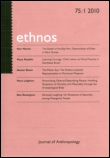
ETHNOS
Scope & Guideline
Exploring the Depths of Culture and Society
Introduction
Aims and Scopes
- Cultural Anthropology and Ethnography:
ETHNOS prioritizes ethnographic studies that delve into cultural practices, beliefs, and social structures across various communities, providing in-depth understandings of lived experiences. - Interdisciplinary Approaches:
The journal encourages interdisciplinary methodologies that integrate perspectives from sociology, political science, environmental studies, and other fields to enrich anthropological discourse. - Focus on Contemporary Issues:
Research published in ETHNOS often addresses pressing contemporary issues such as migration, climate change, and social inequalities, reflecting the journal's commitment to relevance in current socio-political contexts. - Exploration of Non-Human Relations:
A unique aspect of ETHNOS is its exploration of human-nonhuman relationships, examining how these interactions shape social and ecological landscapes. - Ethics and Care in Anthropology:
The journal emphasizes ethical considerations in anthropological research, particularly regarding care practices, social justice, and the responsibilities of researchers towards their subjects.
Trending and Emerging
- Environmental Anthropology and Climate Change:
There is a noticeable increase in research focusing on environmental issues and the impacts of climate change, highlighting the need for anthropological perspectives in understanding ecological crises. - Migration and Mobility Studies:
Papers exploring migration, refugee experiences, and transnational movements are on the rise, indicating a growing recognition of the complexities surrounding human mobility in a globalized world. - Multispecies Ethnography:
Emerging themes in multispecies relations reflect a shift towards understanding the interconnectedness of human and non-human lives, emphasizing the role of other species in socio-cultural contexts. - Digital Ethnography and Technology:
Research integrating digital platforms and technological impacts on social interactions and cultural practices is increasingly prominent, showcasing the relevance of digital landscapes in contemporary anthropology. - Critical Care Ethics and Social Justice:
A trend towards examining care practices through ethical lenses, particularly in contexts of social justice and inequality, reflects a broader concern for marginalized communities and their narratives.
Declining or Waning
- Traditional Ethnographic Studies:
There seems to be a waning interest in traditional ethnographic studies that do not engage critically with contemporary issues, as the journal increasingly favors research that addresses urgent social phenomena. - Focus on Western-centric Perspectives:
Papers that primarily focus on Western societies or issues without a comparative or global context are less frequently published, indicating a shift towards more global and diverse anthropological narratives. - Historical Anthropological Analysis:
Research that centers predominantly on historical analysis, without connecting to present-day implications or contexts, appears to be less favored in recent issues.
Similar Journals

Gazeta de Antropologia
Unlocking the Secrets of Social Structures.Gazeta de Antropologia is an esteemed open-access journal dedicated to the field of anthropology, published by the ASOC GRANADINA ANTROPOLOGIA in Spain. Since its inception in 1982, this journal has provided a platform for scholarly research, fostering a global discourse on human cultures and social practices. With an ISSN of 2340-2792, it operates under an open-access model, ensuring that all research is freely accessible to readers worldwide. The journal has been acknowledged in the Scopus Rankings, positioned at #412 out of 502 within the Social Sciences category of anthropology, reflecting its commitment to disseminating high-quality research despite its current Q4 quartile ranking. As it converges its efforts from 2012 to 2024, Gazeta de Antropologia aims to engage researchers, professionals, and students alike, enriching the anthropological landscape through a diverse array of articles that contribute to the understanding of cultural dynamics and social structures.

Annual Review of Anthropology
Exploring the Depths of Human CultureAnnual Review of Anthropology is a premier journal published by Annual Reviews, dedicated to providing comprehensive and authoritative reviews in the field of anthropology. Established with the goal of synthesizing essential research findings, this influential publication not only shapes contemporary anthropological discourse but also facilitates interdisciplinary dialogue within the broader realm of social sciences and cultural studies. With an impressive impact factor that places it in the Q1 category across multiple classifications, including Anthropology and Arts and Humanities, this journal is highly regarded by researchers and academics alike. The Annual Review of Anthropology has been a trusted resource for critical insights and transformative ideas, helping to advance the understanding of human societies from 1980 to the present. Although it does not offer open access, access to its articles is available through various academic institutions, ensuring that both seasoned scholars and students can benefit from its wealth of knowledge. With a Scopus ranking placing it in the top percentiles for relevant subjects, this journal is essential reading for anyone looking to stay at the forefront of anthropological research.
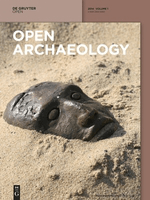
Open Archaeology
Empowering Discoveries, Enhancing ConservationOpen Archaeology is a distinguished open-access journal dedicated to publishing high-quality research in the fields of archaeology, conservation, and education. Since its inception in 2015, the journal has established itself under the esteemed publication of DE GRUYTER POLAND SP Z O O, experiencing rapid growth and recognition, culminating in a Q1 ranking in both Archaeology and Conservation categories as of 2023. Based in the vibrant academic environment of Poland, Open Archaeology caters to a global audience, illustrated by its Scopus rankings which position it 16th in Conservation and 69th in Archaeology, showcasing its significant impact in the arts and humanities sphere. The journal aims to foster interdisciplinary discourse and disseminate innovative research findings to enhance understanding and preservation of cultural heritage. With an unwavering commitment to open access, it encourages widespread dissemination of knowledge, making it an invaluable resource for researchers, professionals, and students alike.

DIALECTICAL ANTHROPOLOGY
Illuminating the Nuances of Dialectical ThoughtDIALECTICAL ANTHROPOLOGY, published by SPRINGER, is a prestigious journal within the field of anthropology, recognized for its substantial contributions to dialectical and critical theory in social research. Since its inception in 1975, the journal has carved a niche by exploring the intersections of culture, society, and politics, making it an essential resource for scholars and practitioners. With an impact factor that places it in the Q2 category for both anthropology and arts and humanities, and significant rankings in sociology and political science, it reflects a solid scholarly reputation. The journal operates on a subscription basis, allowing for a wide dissemination of rigorous academic research without open access. With ISSN 0304-4092 and E-ISSN 1573-0786, DIALECTICAL ANTHROPOLOGY serves as a crucial platform for fostering dialogue and advancing knowledge in contemporary anthropology and related disciplines. As a researcher, professional, or student, engaging with the insights presented in this journal will deepen your understanding of the dynamic interplay between structural and agency-oriented perspectives in social contexts.

Anthropological Notebooks
Bridging Disciplines for a Deeper Understanding of HumanityAnthropological Notebooks, published by the SLOVENE ANTHROPOLOGICAL SOC, is a noteworthy journal within the field of anthropology. Established in Slovenia, this journal aims to provide a platform for scholarly dialogue and dissemination of anthropological research, fostering interdisciplinary approaches and global perspectives. Although it currently holds a Q4 quartile ranking in anthropology and ranks #421 out of 502 in Scopus, it serves as an essential conduit for emerging voices and innovative ideas in the discipline. Covering research published from 2010 to 2019 and from 2021 to 2024, the journal invites contributions that explore diverse cultural narratives and anthropological insights. Despite its limited open access options, Anthropological Notebooks remains a crucial resource for researchers, professionals, and students seeking to engage with contemporary anthropological discourse and enrich their understanding of human societies.
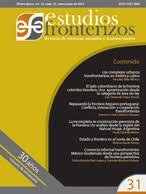
Estudios Fronterizos
Exploring the Complexities of Borders and BeyondEstudios Fronterizos is a prestigious academic journal published by the Universidad Autónoma de Baja California, renowned for its contributions to interdisciplinary studies concerning border issues, with a focus on the social sciences, including Anthropology, History, Demography, and Political Science. Since its inception in 1983, this Open Access journal has fostered academic dialogue by providing an accessible platform for researchers, professionals, and students to share their findings and insights. With its impressive impact factor and recognition as a Q1 and Q2 journal across various disciplines as of 2023, Estudios Fronterizos not only serves as a crucial resource for contemporary research on border dynamics but also stands out in comparisons to its peers—ranked within the top percentiles in several categories such as Arts and Humanities, Social Sciences, and Demography according to Scopus. The journal's expanding scope and commitment to academic rigor ensure its role as a foundational resource for those seeking to understand the complexities of border studies in a globalized world.
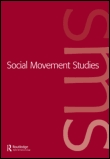
Social Movement Studies
Advancing Understanding of Social MovementsSocial Movement Studies, published by ROUTLEDGE JOURNALS, TAYLOR & FRANCIS LTD, is a premier academic journal dedicated to the interdisciplinary exploration of social movements, their dynamics, impacts, and the sociopolitical contexts in which they arise. With an ISSN of 1474-2837 and an E-ISSN of 1474-2829, this journal plays a pivotal role in the fields of Cultural Studies, Sociology, and Political Science, as evidenced by its impressive Q1 ranking in these categories for 2023. The journal's significant position is further underscored by its Scopus rankings, placing it in the 99th percentile for Cultural Studies and the 95th for Sociology and Political Science, indicating its substantial contribution to scholarly discourse. Although not open access, the journal fosters a rich publication environment from 2010 to 2024, encouraging rigorous empirical research and theoretical innovation that enriches our understanding of grassroots mobilization and collective action. Scholars, professionals, and students alike will find a wealth of insights and critical analyses that empower them to engage effectively with contemporary social issues.
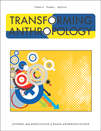
Transforming Anthropology
Championing Contemporary Issues in AnthropologyTransforming Anthropology is a dynamic and influential journal in the field of Anthropology, published by Wiley. With an ISSN of 1051-0559 and an E-ISSN of 1548-7466, this journal has established a reputable position within academic circles, evidenced by its impressive Q2 rating in the 2023 category quartiles and a 77th percentile rank in the Scopus Ranks for Social Sciences. Since its inception, the journal has evolved to reflect contemporary anthropological discourse, addressing crucial issues from diverse perspectives. Although it does not currently operate under an Open Access model, its content remains accessible to a global readership eager to engage with pioneering research. Spanning converged years from 1990 to 1994 and 2010 to 2024, Transforming Anthropology serves as a vital platform for exploring transformative ideas and methodologies within the discipline. Researchers, professionals, and students alike can benefit from the scholarly contributions and insightful discussions fostered within its pages, making it an essential resource for anyone invested in the complexities of human culture and society.

Social Analysis
Charting New Territories in Social AnalysisSocial Analysis, an esteemed academic journal published by BERGHAHN JOURNALS, is at the forefront of interdisciplinary research, focusing on the dynamic intersections of anthropology, cultural studies, sociology, and the arts and humanities. Since its inception in 2002 and having transitioned to an Open Access model in 2020, the journal ensures that critical social research is widely accessible to scholars and the public alike. With an impressive Q1 ranking in Anthropology and cultural studies and holding a notable Q2 in Sociology and Political Science, it garners attention from a large academic audience, as evidenced by its high Scopus rankings: 10th in general arts and humanities and 153rd in cultural studies. This signifies its influential role in shaping contemporary discourse and providing a platform for innovative ideas and methodologies in understanding social phenomena. Based in Brooklyn, NY, the journal is dedicated to fostering scholarly dialogue and advancing the field, making it an essential resource for researchers, professionals, and students eager to engage with and contribute to the field of social analysis.
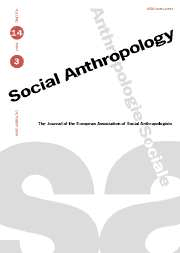
Social Anthropology
Unraveling the Threads of Social PracticeSocial Anthropology is a leading journal published by BERGHAHN JOURNALS, focusing on the diverse and dynamic field of anthropology. With an ISSN of 0964-0282 and an E-ISSN of 1469-8676, this open-access journal has been a cornerstone of scholarly communication since its inception in 1982, becoming fully accessible to the public since 2022. Situated in the United States, the journal aims to disseminate high-quality research that explores sociocultural dimensions of human behavior across various contexts, addressing pressing contemporary issues through a multidisciplinary lens. With impressive rankings, including Q2 in Anthropology and Arts and Humanities, and strong positions in Sociology and Developmental Psychology according to Scopus metrics, Social Anthropology serves as an essential platform for researchers, professionals, and students committed to advancing our understanding of social practices and cultural norms. Its commitment to fostering intellectual discourse makes it a vital resource for those seeking to deepen their knowledge and insight into the anthropological landscape.